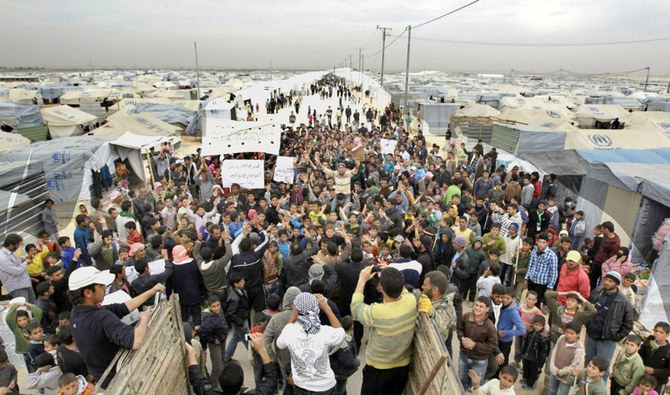BEIRUT: Lebanese President Michel Aoun told Spanish Foreign Minister Josep Borrell on Friday that Lebanon is hoping the EU will change its stance over the return of Syrian refugees “to avoid repercussions for Lebanon.” Aoun warned Borrell that Europe’s current stance “will force us to take steps to organize this return with the Syrian government.”
In a meeting with Egyptian Prime Minister Mostafa Madbouly on the same day, Aoun said that Syrian refugees “face political incitement and exploitation because they have not returned to their country, which raises questions about the reasons.”
On Thursday, Volker Türk, the assistant high commissioner for protection at the Office of the UN High Commissioner for Refugees (UNHCR), announced in a talk at the American University of Beirut (AUB) that the UNHCR’s goal during the next 10 years is to resettle a million refugees around the world in other countries.
“We want to encourage countries to host refugees,” he said. “This number does not only include Syrian refugees, because the refugee crisis has worsened since 2011, due to conflicts that have erupted around the world.”
Türk said that there are more than 6 million internally displaced persons (IDPs) inside Syria and more than 10 million Syrian refugees in neighboring countries. “The peak of this displacement was when Syrian refugees suddenly flocked to Europe, and European countries did not have the mechanisms in place to deal with this matter,” he said. There are 1.1 million Syrian refugees in Lebanon, according to the UNHCR.
Türk flew to Beirut after a visit to Syria, during which he held meetings with Syrian officials and discussed the issue of Syrian refugees. “The discussion with the Syrian side was forthright, and they conveyed a clear message that they want to work with us (to assist) Syrian refugees who wish to return,” he told Arab News.
Arab News learned that, during his visit, Türk met an assistant to Syria’s deputy foreign minister, but did not meet with any senior officials from the Syrian government.
Türk said that he and his accompanying delegation visited the Zabadani district, much of which has been destroyed by the Syrian conflict. He said that he focused during his meetings with IDPs who have returned to their homes “on the quality of life they lead as well as their needs.”
Türk believes that the Global Compact on Refugees (GCR), adopted by the UN General Assembly in 2018 by a large majority to improve the way the crisis is managed at an international level “(will) keep the asylum issue in the international community’s mind in a sustainable manner instead of addressing it occasionally.”
Türk emphasized that the importance of the GCR is that it includes an item on the protection of refugees who cannot return to their countries, notes the situation of refugees living below the poverty line, and makes clear to the international community that it has a responsibility to deal with the consequences of these crises and to find solutions to them.
The GCR — which is not binding — was ratified by 181 countries. America and Hungary voted against it, and the Dominican Republic, Eritrea and Libya abstained.
The compact contains four main objectives: Taking pressure off host countries; promoting the self-reliance of refugees; broadening access to third-country solutions; and contributing to securing the necessary conditions for the refugees’ safe and dignified return to their countries of origin.
The GCR also includes a paragraph on the adoption of the 2016 New York Declaration for Refugees and Migrants, which focuses on the protection of people who are forced to flee their countries and on supporting the countries that host them.
During the AUB session, there was a lively discussion about the extent to which countries can be pressured to resettle refugees. Türk was also confronted by skepticism about the resettlement of refugees — with some suggesting that they should be have to remain in the first host country they enter.
Tarek Mitri, former Lebanese minister and director of the Issam Fares Institute, which organized the session, said: “Lebanese society is divided between demands for the immediate repatriation of refugees and support for their voluntary and safe return; thus, this society is in fear. The most important question is whether the Syrian regime wants the refugees to return at a time when it is immersed in engineering a new demography in Syria. And what has become of the Russian initiative to facilitate the return of refugees? Its owners are now saying during private meetings that it has become so difficult to implement. They have even admitted that pressure from the Syrian regime has stopped the initiative, and that this has nothing to do with securing finance for the reconstruction of Syria.”
Türk stressed that it is important for Syrian refugees to obtain birth and citizenship documents, adding that this is a right for all refugees as per international conventions.
However, while he insisted on that refugees who wish to return home must be allowed to do so, he did not offer any assurance that the Syrian authorities are willing to receive them.
“Those who know refugees who wish to return can inform our offices in Lebanon and we will see what can be done,” he said.




























